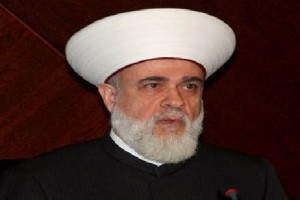 Lebanon Grand Mufti Sheikh Mohammed Rashid Qabbani on Friday called on all lawmakers to “decide on an electoral law that is fair and that does not allow any party to impose its dominance over any region in the country.”
Lebanon Grand Mufti Sheikh Mohammed Rashid Qabbani on Friday called on all lawmakers to “decide on an electoral law that is fair and that does not allow any party to impose its dominance over any region in the country.”
“We want a law that would ensure proper representation for the Lebanese, and let the slogan of the agreed on electoral law be ‘proper elections for a proper representation’, rather than for domination and extending the influence of a certain party. This is an advice that we give to our lawmakers,” said Qabbani.
Commenting on the uprising in Syria he pleaded to God to “destroy those who are killing people and destroying their homes over their heads.” A possible reference to the security forces of the Syrian regime of president Bashar al Assad who have killed over 30,000 Syrians since the uprising began in March 2011.
MPs from the joint parliamentary committees have failed in five sessions to bridge the deep differences between the March 14 and the Hezbollah-led March 8 over which legislation best guarantees fair representation for all the parties in the 2013 elections.
The committees are discussing three proposals:
The cabinet’s draft electoral law which was approved earlier in August and which divides Lebanon into 13 medium-sized districts based on a system of proportional representation.
The March 14 proposal that would divide Lebanon into 50 small districts under a winner-takes-all-system
The so called Orthodox Gathering proposal which was forwarded by Aoun’s Change and Reform parliamentary bloc, which calls on each sect in Lebanon to vote only for its candidate in the elections based on proportional representation and one electoral district for the whole country .
Progressive Socialist party leader MP Walid Jumblatt favors the current 1960 electoral law as modified in Doha Qatar in 2008 and which calls for 26 districts and winner take all majority, but the Maronite bishops council rejected in September the 1960 electoral law because “it does not ensure fair representation.” They also oppose any amendment to the 1960 law, “because it resulted in representation that violates coexistence.”
Future Movement and the other parties within March 14 alliance have rejected the cabinet’s proposal.

Leave a Reply
You must be logged in to post a comment.